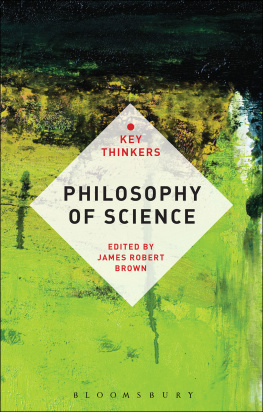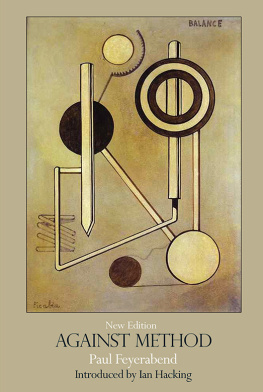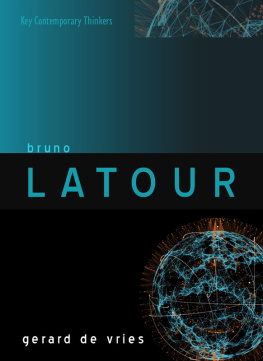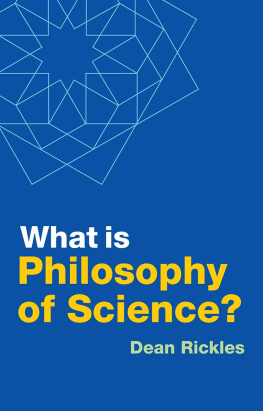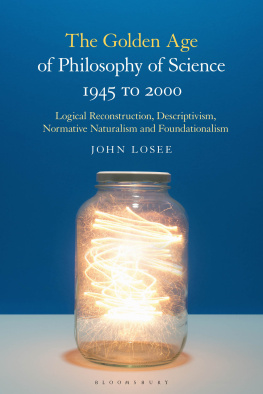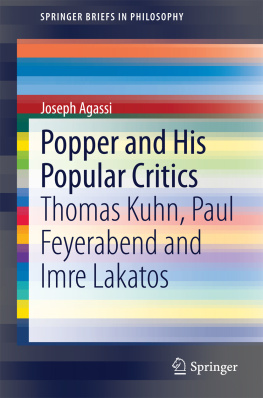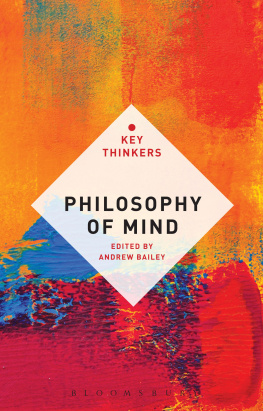Philosophy of Science:
The Key Thinkers
BloomsburyKey Thinkers
The Key Thinkers series is aimed at undergraduate students and offers clear, concise and accessible edited guides to the key thinkers in each of the central topics in philosophy. Each book offers a comprehensive overview of the major thinkers who have contributed to the historical development of a key area of philosophy, providing a survey of their major works and the evolution of the central ideas in that area.
Key Thinkers in Philosophy available now from Bloomsbury:
Aesthetics, edited by Alessandro Giovannelli
Epistemology, edited by Stephen Hetherington
Ethics, edited by Tom Angier
Philosophy of Religion, edited by Jeffrey J. Jordan
Philosophy of Science:
The Key Thinkers
Edited by
James Robert Brown

Bloomsbury Academic
An imprint of Bloomsbury Publishing Plc
50 Bedford Square | 1385 Broadway |
London | New York |
WC1B 3DP | NY 10018 |
UK | USA |
www.bloomsbury.com
Bloomsbury is a registered trade mark of Bloomsbury Publishing Plc
James Robert Brown and Contributors 2012
James Robert Brown has asserted his right under the Copyright,
Designs and Patents Act, 1988, to be identified as Author of this work.
All rights reserved. No part of this publication may be reproduced or transmitted in any form or by any means, electronic or mechanical, including photocopying, recording, or any information storage or retrieval system, without prior permission in writing from the publishers.
No responsibility for loss caused to any individual or organization acting on or refraining from action as a result of the material in this publication can be accepted by Bloomsbury or the author.
British Library Cataloguing-in-Publication Data
A catalogue record for this book is available from the British Library.
ISBN: HB: 978-1-4411-2881-2
PB: 978-1-4411-4200-9
ePUB: 978-1-4411-5254-1
ePDF: 978-1-4411-8665-2
Library of Congress Cataloging-in-Publication Data
A catalog record for this book is available from the Library of Congress
Contents
1. Experience and Necessity: The Mill-Whewell Debate
Laura J. Snyder
2. Conventionalism: Poincar, Duhem, Reichenbach
Torsten Wilholt
3. The Vienna Circle: Moritz Schlick, Otto Neurath and Rudolf Carnap
Friedrich Stadler
4. Carl G. Hempel: Logical Empiricist
Martin Curd
5. Anti-Inductivism as Worldview: The Philosophy of Karl Popper
Steve Fuller
6. Historical Approaches: Kuhn, Lakatos and Feyerabend
Martin Carrier
7. The Contingency of the Causal Nexus: Ghazali and Modern Science
Arun Bala
8. Sociology of Science: Bloor, Collins, Latour
Martin Kusch
9. One Cannot Be Just a Little Bit Realist: Putnam and van Fraassen
Stathis Psillos
10. Beyond Theories: Cartwright and Hacking
William Seager
11. Feminist Critiques: Harding and Longino
Janet Kourany
Acknowledgements
My first thanks go to the people at Continuum for inviting me to edit this book and for seeing it through production, especially Sarah Campbell and Tom Crick. They have been a great pleasure to work with. Perhaps my biggest thanks goes to the contributing authors without them, nothing. They have risen to the occasion magnificently. Finally, thanks to Kevin Kuhl for doing the index. I am very grateful to all.
Notes on Contributors
Arun Bala is by training a physicist and a philosopher. He taught history and philosophy of science at the National University of Singapore and held positions as Visiting Professor in the Department of Philosophy and as adjunct professor at Trinity College, both in the University of Toronto. He is presently Visiting Senior Fellow with the Institute of Southeast Asian Studies in Singapore. He is the author of The Dialogue of Civilizations in the Birth of Modern Science (Palgrave Macmillan, 2008) and editor of the forthcoming book, Asia, Europe and the Emergence of Modern Science: Knowledge Crossing Boundaries (Palgrave Macmillan, 2012) .
James Robert Brown is a professor of philosophy at the University of Toronto. His interests include a wide range of topics in the philosophy of science and mathematics: thought experiments, foundational issues in mathematics and physics, visual reasoning and, issues involving science and society, such as the role of commercialization in medical research. His books include The Rational and the Social (Routledge, 1989), The Laboratory of the Mind: Thought Experiments in the Natural Science (Routledge, 1991/2010), Smoke and Mirrors: How Science Reflects Reality (Routledge, 1994), Philosophy of Mathematics: An Introduction to the World of Proofs and Pictures (Routledge, 1999/2008), Who Rules in Science: A Guide to the Wars (Harvard, 2001), Platonism, Naturalism and Mathematical Knowledge (Routledge, 2011) and others forthcoming.
Martin Carrier is professor of philosophy at Bielefeld University and part of the Institute of Science and Technology Studies (IWT). His chief area of work is the philosophy of science, in particular, historical changes in science and scientific method, theory-ladenness and empirical testability, inter-theoretic relations and reductionism and, presently, methodological issues of application-oriented research. He addresses methodological changes imposed on science by the pressure of practice. Carrier is a member of the German Academy of Science Leopoldina, the Mainz Academy of Sciences, Humanities and Literature and the Academia Europaea. He was a-warded the Leibniz Prize of the German Research Association (DFG) for 2008.
Martin Curd teaches philosophy of science at Purdue University. His books include Argument and Analysis, Philosophy of Science: The Central Issues (2nd edition edited with Jan Cover and Chris Pincock) and The Routledge Companion to Philosophy of Science (edited with Stathis Psillos). One of his few regrets in life is that he never took a class with Carl Hempel.
Steve Fuller holds the Auguste Comte Chair in Social Epistemology at the Department of Sociology, University of Warwick. Originally trained in history and philosophy of science, he is best known for his work in the field of social epistemology (also the name of a quarterly journal he founded in 1987 and the first of his 18 books). His most recent books are The Sociology of Intellectual Life: The Career of the Mind in and Around the Academy (Sage, 2009), Science: The Art of Living (Acumen and McGillQueens University Press, 2010) and Humanity 2.0: The Past, Present and Future of What It Means to Be Human (Palgrave Macmillan, 2011). He is currently working on a history of epistemology.
Janet Kourany is a fellow of the John J. Reilly Center for Science, Technology, and Values at the University of Notre Dame as well as an associate professor in Notre Dames Philosophy Department, with special interests in issues concerned with science and values and feminist philosophy of science. Her most recent work includes Philosophy of Science after Feminism (Oxford University Press, 2010) and The Challenge of the Social and the Pressure of Practice: Science and Values Revisited, edited with Martin Carrier and Don Howard (University of Pittsburgh Press, 2008).
Next page
